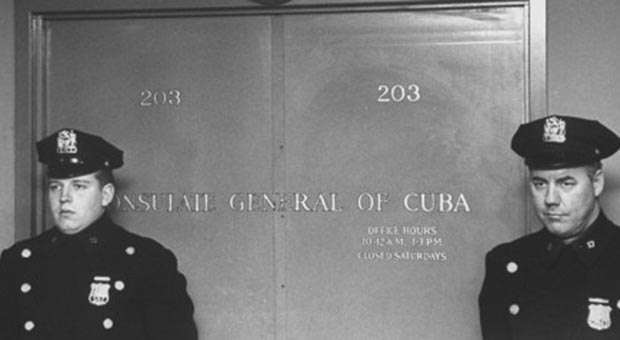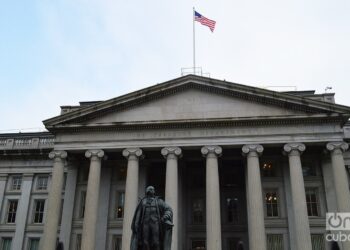The announcement of the consular functions suspension of the Cuba Interests Section in Washington due to the impossibility of finding a U.S. bank that provide it basic financial services, shows the precarious relations between Cuba and the U.S.
Even in an environment of relative relaxation, the existence of uncertainties associated to the existing structures of hostility, as the presence of Cuba on the terrorist countries list by the State Department, or a health crisis of contractor Alan Gross, prisoner in Cuba, could derail the little progress in relations between the two countries. Policymakers in Washington and Havana should anticipate and avoid that scenario.
None of the two governments want to dispense with the interest sections created in 1977, during Carter administration. Cuba has in its first consulate in Washington a not insignificant entry to U.S. political world and the Cuban community abroad. At the same time, the U.S. government appreciates the usefulness of its office in Cuba. The former Secretary of State Condoleezza Rice stated in her memoirs that the U.S. would like to replicate the experience of the interest sections with Iran. Rice considered that the office in Havana enables Washington getting informed and having a space for positive interaction with Cuban society, discussing issues of mutual interest with the host government.
The interest offices are also consular missions where both governments grant visas. This is where the contradictions of policy towards Cuba exposed by the recent speech by Secretary of State John Kerry before the Organization of American States (OAS) are relevant. Kerry stressed the U.S. commitment to the travel exchanges and remittance between the two countries. He almost said that travels to Cuba should be extended because U.S. citizens are “our best ambassadors.”
The problem is that visits to Cuba of these “ambassadors of our ideals, values and beliefs” – so admired by Kerry-are limited by Helms-Burton law. United States has decided to limit its capacity to influence on Cuban society in the hope that one day, lacking in currencies, the Cuban government to collapse. Neither Kerry nor President Obama have said how they plan to loosen the knot imposed in 1996 by lost property claimants, supporters of harassment and isolation against Cuba, to that U.S. strategy of “ideals, values and beliefs,” .
The defects of that bad policy are aggravated by the suspension of consular services at the Cuban office in Washington. Even the limited visits of “our best ambassadors” to Cuba could disappear due to the negligence of the executive branch. The Department of State does not just take Cuba out from the aforementioned list, to which it does not belong. Instead of using taxpayer money to pursue real terrorists, the Treasury Department has stepped up sanctions against financial transactions with Cuba. The result is the Cuban impossibility to have minimum accounts, direct effect of panic imposed to banks for the persecution of the Treasury Department, which has come to absurdity of pursuing accounts of a Latin American evangelical churches congress in Havana.
With Cuban Interests Section in Washington without bank account, the opportunity cost of that irrational policy towards Cuba increases. Both President Obama and Secretary Kerry have recognized that significant changes have occurred in Cuba . However, by limiting travels to Cuba, U.S. harms the emerging non-state sector. How can Kerry ask for hemispheric support to demand political changes in Cuba, when Washington hinders the changes that have already taken place?
President Obama’s speech in Miami on the need for a “more creative” policy and his recognition that important changes are happening in Cuba go in the right direction, but it is not enough.
As a Chinese proverb says, “Lighting a candle is more important than cursing darkness.” At the height of a second presidential term, Obama should support his claims about the anachronism of policy towards Cuba through deeper actions than some slight negotiations with Havana on search and rescue.
The suspension of consular services has been a clarion call to Miami. It has warned about the possible disastrous consequences for family trips of the politicking inclusion of Cuba on the list of terrorist countries by the State Department. The clear responsibility of U.S. policy in the suspension of Cuban consular functions has placed in the background the limitations and excessive costs that Cuban government imposes on its emigrants who wish to visit the island. Instead of opening political space for such claims to come to fruition, U.S. persecution of Cuban financial transactions displaces them from the dialogue between Havana’s government and its citizens. Unlike other times, reviews lamenting the suspension of Cuban consular representations have been more than enough in Miami, including a call by Congressman Joe Garcia (D-Fl) to update U.S. regulations that have led to this crisis.
The State Department has said it seeks to find a bank willing to deal with this nonsense. That’s better than nothing, but those in charge of Obama’s policy have the political opportunity to use the crisis to lay deeper patterns . The president should cut for once the Gordian knot of the crisis. United States has not documented Cuban sponsorship of any terrorist act in over twenty years. The State Department should remove Cuba from the list of nations supporting terrorism.
By: Arturo López Levy










